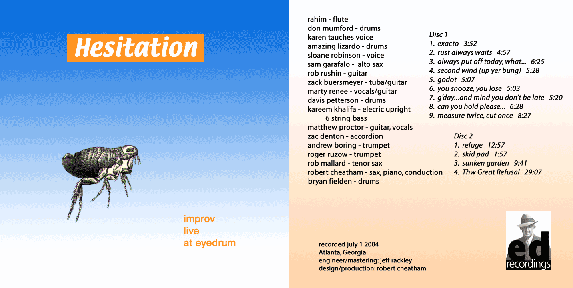
HESITATION
Fehta Murghana
Hesitation is always on the brink, the verge, always 'about
to'. To
hesitate is to wait, to compile...but not forever. To hesitate is to
stop our approach, to not come any nearer: to not yet make
a gesture of action and power --but to not let go either! It is NOT
QUITE a decision, but neither is it a pusillanimous pussy footing.
To hesitate is not to step forward, nor to step backward; it is a
pause in midstep. Maybe because all of a sudden one has become
extraordinarily watchful. Perhaps the hesitation gives a frisson of
excitement before the to-come actually happens, before there
is any happening (or more properly, between happenings since there can
hardly be a before of all happenings.)
Maybe the hesitation is a warning, a tocsin, composed of momentary silence
instead of a scream, the crouch before the leap.
Hesitation can be a function of the powerful as well as the powerless
-- even if in that indecipherable movement of non-movement it seems to
be neither. However -- to hesitate can also be seen as a time when one's
opponent can strike, can be seen as a confusion, rather than a gathering
or rallying.
To hesitate is to suspend time, judgement, action. It is to have a
moment which is the complete counterpart of the 'inevitable,' that
which is irretreivable after the action has happened. (For a very brief
moment it is even to call into question the very possibility of action
happening at all, as if we could live in a universe of 'betweens', of
cracks, all histories and times disappearing ---even if only for the time
of the expectant hush, the no-time of suspension.
Hesitation is an interval, an unconscionable fraction that exists
between stoppage and continuance. This uncalculable postponement recedes
almost as quickly as it washes over us. Almost. But not quite. There,
in that 'almost' and 'not quite' is where the improvisational coils, where
actions are infinite in their inactive possibility. There, for just a
moment, and before the infinite catastrophes of action, almost anything
seems possible.*
*(The kabalistic doctrine of tzim tsum, or contraction, as well as
Giorgio
Agamben’s notion of the ‘zone of indifference’ of the camp
also as
the idea of a ‘state of exception,’ are all attempts to deal
with a hiatus
in the general historical flow of events. Even Carl Schmitt’s katechon,
taken from biblical hermeneutics and reffering to both ‘restraining’
and
possessing can be pertinent, in the sense of holding back or restraining
lawlessness -- perhaps even evil personified. Restraint, or this
transhistorical moment of hesitation before the release of the revealing
of lawlessness, is somewhat the inverse of the kabalistic contraction
of
a supreme force which would be necessary to give room for human existence
to come into reality. Although perhaps tzim tzum is not as much
of a
contradiction with katechon as all that, since a point couold be
made
that human kind is the source of that ultiamte lawlessness, even
nihilism, which is nevertheless necessary as well as impossible. The
human forms a stuttering interpollation, a hesitation, before the closings
of death on one end and birth on the other, all else in between is
suspension. Certainly the ancient gnostics believed that life was akin
to the bloody autonomous zone of indifference of the concentration camp.
‘Hesitation’ itself is iinstalled in the very heart of the human,
AS the
very heart of the human, that zone --whether of life itself, or of the
momentary hiatus iin decison making, in when and whether to put the
next step, a step not, no, never, beyond .)
Fehta Murghana
july 24, 1994